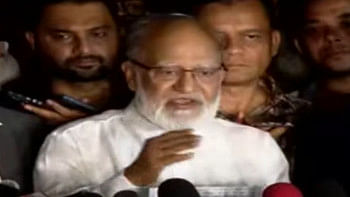UN envoy in Myanmar to push for reforms
UN envoy Ibrahim Gambari arrived in Myanmar yesterday to try to press the ruling junta to include detained opposition leader Aung San Suu Kyi in promised multi-party elections.
Gambari was set to meet foreign diplomats later Thursday, and on previous missions has also been allowed to meet Aung San Suu Kyi and senior government officials.
However, on his last visit he was shunned by the regime's reclusive leader, Senior General Than Shwe, and it was unclear if he would see him this time.
The rest of his schedule has not been announced and his departure date has not been set, although diplomats expect him to leave on Sunday.
It is Gambari's third visit in all since last September's deadly crackdown on anti-government street protests, and the first since the junta's surprise announcement last month of a constitutional referendum in May and multi-party elections in 2010.
If held, they would be the first elections since Aung San Suu Kyi led her National League for Democracy (NLD) to a landslide victory in 1990 polls.
The junta ignored that result and has kept the Nobel peace laureate under house arrest for 12 of the last 18 years.
The regime has said its new charter will bar Aung San Suu Kyi from running in elections on the grounds that her late husband was foreign, while a new law criminalises giving speeches and distributing pamphlets about the referendum.
Gambari is expected to press the junta to allow some kind of campaigning during the referendum while looking for ways to include Aung San Suu Kyi and her party in the polls.
However, analysts say that he faces an uphill battle in trying to win any concessions from the unpredictable generals, who have so far resisted outside pressure to reform.
The NLD has warned the constitution "cannot be accepted by the people," but has stopped short of calling for a boycott or urging a "No" vote.
Last week it filed a new case with the Supreme Court, seeking to force the military government to recognise its 1990 victory, but its legal challenge was dismissed without even a hearing.
The party fears the junta will try to formally void that result by pushing ahead with its own election plan.
So far, the junta has only been willing to make minor concessions, such as allowing Gambari to visit, despite the worldwide outrage sparked by the bloody repression of September's peaceful marches led by Buddhist monks.
Those protests were the biggest challenge to military rule for nearly two decades, and the military responded by opening fire on the crowds.
At least 31 people were killed then, according to the United Nations, while Human Rights Watch has put the toll at more than 100.
The US-based rights watchdog urged the regime to heed Gambari's calls for a more inclusive election process.
"Gambari should tell the generals that marching a fearful population through a stage-managed referendum will not advance democracy or reconciliation in Burma," said Brad Adams, Asia director at Human Rights Watch.
"A referendum under these repressive conditions will only cement in place continued military rule."
The military has ruled Myanmar, formerly known as Burma, since 1962.

 For all latest news, follow The Daily Star's Google News channel.
For all latest news, follow The Daily Star's Google News channel. 



Comments